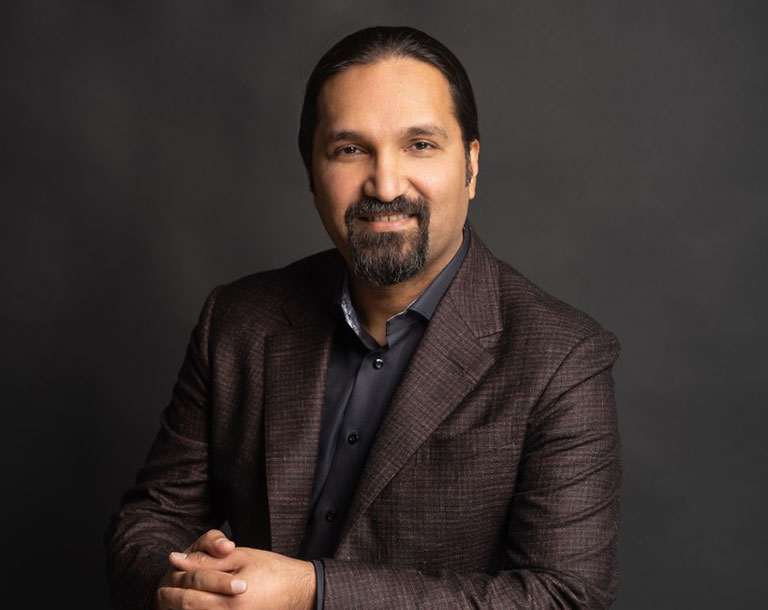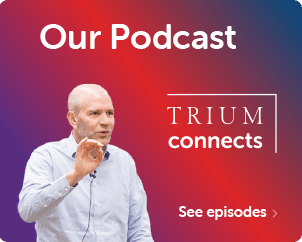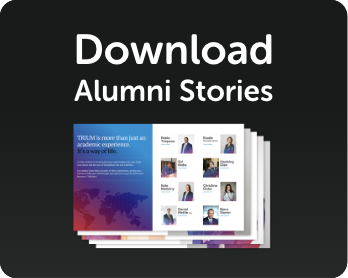

Nabil Bukhari
Nabil Bukhari (Class of 2020)
Chief Technology & Product Officer and General Manager of Subscriptions, Extreme Networks
“The quest for knowledge is an endless journey without a final stop, and I find great joy in this expedition. The TRIUM experience marked a fulfilling chapter on this perpetual voyage.”
As we face the coming age of AI, fast-changing global events, and major technological disruption, we turn to leaders like futurist Nabil Bukhari (Class of 2020), whose deep background in leadership, technology and AI can help us navigate uncertain waters. His career has taken him around the world to entrepreneurial growth opportunities and leadership roles at some of the most recognized names in tech, and he has a deep passion for the democratization of technology. “I am determined to contribute to a world where tech has a positive social impact,” he says.
Nabil recently caught up with TRIUM about how the program helped further his goal of democratizing technology, what excites him about the coming age of AI, and what he learned from TRIUM about leadership in global uncertainty.
What was your motivation for pursuing a Global EMBA? Why did you choose TRIUM among other global programs?
My decision to pursue a Global EMBA was driven by unconventional motives. While traditional goals like career advancement and mastering leadership skills naturally unfolded at TRIUM, my primary aim was to engage with global leaders and collaboratively shape the future landscape of leadership. We stand on the brink of a new era characterized by boundless change and possibilities, rendering past lessons obsolete as guides for tomorrow. What we require now is a fresh paradigm, a novel approach to navigate the unknown terrain ahead and actualize innovative futures. My aspiration was to co-create this vision with international leaders within an environment fostering practical creativity, and in my search, TRIUM emerged as the sole contender.
You describe yourself as a futurist. What excites you about the moment we are in, with the coming age of AI?
We are currently experiencing an exceptional moment in human history. This might initially sound like a cliché or exaggerated sentiment that many generations have echoed before, but we can sense that we stand on the brink of a new era.
There are three primary driving forces shaping humanity at this juncture.
Firstly, the pace of change is unprecedented. We are witnessing rapid transformations in businesses, geopolitics, communication methods, societal interactions, and every facet of our individual and collective existence. This is primarily, but not exclusively, fueled by exponential advancements in technology. The trajectory of this change is only accelerating.
Secondly, human interconnectedness has reached an all-time high. Every action impacts everyone! Sometimes directly and immediately, and sometime indirectly and in time. This interconnectivity is only set to intensify further.
Thirdly, our capacity for creation stands out as a uniquely powerful driver. Today, with advancements such as AI on the rise and technologies like quantum computing on the horizon, our ability to create, to do, is fast catching up with our capacity to imagine, presenting both daunting and exhilarating prospects.
Around us, all three of these drivers are trending towards what I refer to as the Age of Infinite. This period will undoubtedly present new obstacles, ones that come with no user manual and no parallels in history, but it’s only through such obstacles that we will realize futures that were till now inconceivable.
What did TRIUM teach you about leadership during uncertainty?
The most profound lesson I gleaned from my time at TRIUM is the essence of self-exploration—as an individual, a leader, and as part of a collective. I owe profound gratitude to my experiences at TRIUM that fostered in me exploration, innovation, and most importantly co-creation. The unmatched faculty at TRIUM, and the diverse and brilliant minds in my cohort are the key influences on my perspective of leadership as we stride into the future.
I firmly believe that modern leadership should encompass the realms of business, technology, and arts, and its sole purpose should be positive human impact. TRIUM embodies these crucial elements by merging the socioeconomic expertise of LSE, the financial acumen of NYU Stern, and the unparalleled leadership skills in marketing and art from HEC.
Leadership in today’s world must also have a global outlook, bridging cultures, generations, and even continents. TRIUM truly grasps this comprehensive approach.
The rise of technology is borderless, and in today’s unpredictable world, business leaders need a deep insight into the global contexts of business decision-making. Can you speak to TRIUM’s emphasis on leadership within geopolitical contexts?
Modern business leaders need a deep grasp of global dynamics and a true respect for diverse cultures across the globe. We are more interconnected than we realize. What strikes a chord in a Tokyo boardroom might not resonate in a chat in Chicago, or a business deal in Nairobi. Yet, it goes beyond that. While everyone praises diversity in the workforce, simply collecting talents from around the tech world is not enough, and leaders must skillfully navigate this diversity. None of this works without a global context.
TRIUM embodied this diversity and global context by bringing together minds from around the world and taking us on a two-year journey across the globe. This extraordinary experience, both in the classroom and through various international destinations, exposed us to unique environments, enriching our knowledge and understanding. Our time in Shanghai, in particular, provided valuable insights into Asian business negotiation strategies in a vibrant market. This kind of hands-on training in unfamiliar markets is often missing in other programs and is sorely required in most western companies.
You say: “I have a passion for the democratization of technology, and I am determined to contribute to a world where tech has a positive social impact.” How do you feel TRIUM helped further this goal of yours?
The global divide between the privileged and underprivileged is increasingly defined by technology’s availability and accessibility. While technology democratization is crucial for progress, it often falls short. The evident examples and impacts of this disparity are all around us. The growing chasm between tech companies and public regulators is a poignant illustration. The exaggerated concerns about AI highlight a lack of comprehension of this pivotal technology, and the associated costs pose barriers not only to companies but also to many nations globally.
In the context of the TRIUM cohort, the composition stands out as exemplary. Leaders from diverse private and public sectors worldwide collaborate to assess the requirements for democratizing technology. Engaging with peers in public policy and various industries beyond my own has been enlightening. These interactions have not only underscored the necessity of technology democratization but also provided insights into its nuances.
Through my TRIUM experience, I am convinced that technology democratization should focus on three key aspects: availability, accessibility, and control. It is crucial not only to ensure the availability of technology but also to enable everyone to harness it within their means (financially, time-wise, and skill-wise). Moreover, users must have control over how technology impacts their businesses and lives.
TRIUM has not only facilitated the exploration of these concepts but also enabled the establishment of global networks to drive these discussions across public and private sectors, geographies, and industries.
What has your return on investment in the program been, or what do you anticipate it will be in the future?
Each individual will calculate their investment and the return on that investment differently, as they rightfully should, given the unique motivations that led them to pursue a global EMBA program. I am certain that I gained much more than anticipated. If given the chance to start afresh, would I embark on the same journey again? The answer for me is a clear, resounding yes.
How would you describe your TRIUM experience in three words?
Unique, immersive, transformative.






